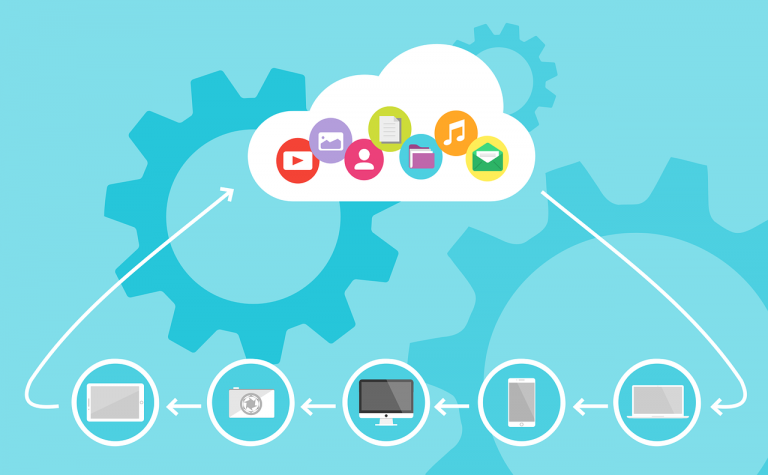Cloud Computing Services are increasingly being used by small & large companies to ensure business continuity. Let’s quickly dive into the world of cloud computing to know about its fundamental aspects.
What is Cloud Computing all about ?
Cloud computing is a trailblazing technological innovation that is increasingly being used by startups & enterprises to proliferate remote work, enable faster & real-time access to data and much more.
So, what’s cloud computing all about?
To put it simply, cloud computing is the practice of delivering computing services over the internet. This involves the utilization of:
- Storage Databases
- Remote Servers
- Software
- Analytics
- Networking
All of these services are used over the internet which results in excellent flexibility of business systems.
Prominent Benefits of Cloud Computing
Traditionally tech companies & businesses depended on in-house infrastructure including IT resources to carry out their daily activities. But, improvements & innovations in technology brought forth cloud computing services.
Here are some astonishing stats about cloud computing:
- Leading reports suggest that the worldwide cloud computing market is set to cross a whopping USD 330 Billion by 2020.
- Almost 90% of existing enterprises are on cloud systems.
- By 2021, more than 92% of workloads will be processed by cloud data centers.
- The US holds the top spot when it comes to the public cloud market with estimated spending of about USD 124.6 Billion in 2019.
Here are some benefits of cloud computing:
- Reduced Costs
As we saw earlier, cloud computing works on the internet. So, enterprises need not invest huge capital to buy software & hardware equipment. They will also save costs of set up & maintenance of such complicated equipment.
- Scalability
Cloud computing services offer excellent flexibility as per your business needs. If you need more storage, simply buy it. If you want some more functionalities, just contact your cloud service provider and they will readily do it for you. This saves huge time & costs while ensuring excellent business scalability & continuity.
- Improved Productivity
The flexibility of cloud services translates to flexible work practices. Employees need not stay at the office to work on on-site desktops. Instead, they can log on to the cloud service and work from the comfort of their home.
Field Projects? Late to the office? Urgently want to change some code? Seamlessly carry out every task on the go with cloud computing services. This enables employees to do more work in less time resulting in improved productivity & operational efficiencies.
- Robust Security
Cloud service providers offer a wide range of services and security is one of them. Any enterprise would want its data to be secured and that is why cloud service providers offer an extensive range of policies, seamless controls & technologies to secure your apps, data & infrastructure from any potential threats.
- Reliability
Disaster recovery, data backup & ease-of-business are some of the amazing features of cloud computing services. Another innovative feature of a cloud provider’s network is the ability to mirror data at multiple redundant sites. Such features make cloud computing highly reliable.
Prominent Types of Cloud Computing
- Public Cloud
As the name implies, public cloud is owned and operated by third-party cloud service providers like Amazon Web Services, Microsoft Azure and more. They take care of all the software, hardware & infrastructure requirements. You just need to log-in to the portal and leverage the services for your enterprise.
- Private Cloud
Private cloud services are mostly used by a single organization or business. Private cloud is generally housed in the office itself. However, there are third-party service providers who host a private cloud and manage it on a private server.
- Hybrid Cloud
The name itself suggests that Hybrid cloud is a combination of public & private cloud. It is more flexible as compared to public or private cloud and offers a gamut of deployment options.
Types of Cloud Computing Services
- Infrastructure as a Service (IaaS)
In this service, enterprises can avail IT infrastructures that comprise virtual machines, storage, operating systems, networks & servers from a third-party cloud provider.
- Platform as a Service (PaaS)
These services are leveraged by companies who want to quickly build & deploy mobile or web apps. The backend infrastructure (storage, databases, network & other requirements) is handled by cloud service providers.
- Software as a Service (SaaS)
As the name implies, companies can use this service to deliver software applications over the cloud (internet). Cloud service providers manage the underlying infrastructure and other requirements like software upgrades, maintenance & security patches.
Use Cases of Cloud Computing
- You can leverage Cloud services to quickly build, deploy & scale mobile/web/API applications. These services are also used to test applications.
- Storage, backup & recovery of data can be easily done with a cloud storage system.
- Data collection and analysis processes are simplified with cloud-based systems.
- Seamless Audio & video streaming via the cloud.
These are some important cloud computing basics for beginners. ARSR holds expertise in cloud computing and offers services like Cloud Management, Cloud Migration & Cloud Strategy for Budding Startups & Large Enterprises.






